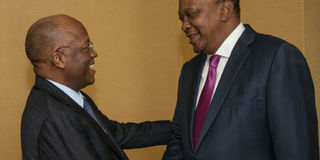Regional leaders preach peace amid EAC gloom

President John Magufuli with his Kenyan counterpart Uhuru Kenyatta in Arusha last month. COURTESY PHOTO
Tanzania- East Africa leaders on Christmas wished their people peace and happiness during the festive season.
Burundian President Pierre Nkurunziza wished his fellow citizens a merry Christmas on his @pnkurunziza Twitter handle.
He asked them to cultivate a culture of praying for one another, adding that they should put their trust in God.
His Rwandan counterpart, Mr Paul Kagame, wrote on his Twitter handle @PaulKagame: “A Merry Christmas to you all. Wishing you a prosperous New Year 2019 as well. For the followers, a big thank you!!”
Ugandan President Yoweri Museveni went further in his Christmas message, asking his “countrymen, countrywomen and bazukulu (grandchildren)” to celebrate responsibly and be aware that alcoholism and promiscuity could have dire consequences.
“Wishing you all a Merry Christmas and Happy New Year. God bless you. I congratulate you for making it to the end of 2018. As we get into the festive season, I urge you to celebrate responsibly.
To the bazukulu, beware that alcoholism and promiscuity comes with a price.
Security agencies are on alert to ensure that we have an incident-free festive season. However, like I have urged you in the past, Security is our collective responsibility. Let us all be alert,” President Museveni wrote on his @KagutaMuseveni Twitter handle.
President Uhuru Kenyatta of Kenya wrote on @UKenyatta: “Margaret and I, together with our family joined Christian faithful for a Christmas Eve Mass at the Holy Ghost Cathedral Mombasa. As we celebrate Christmas and reflect upon God’s blessings for the year, I wish all Kenyans a very Merry Christmas. May God bless you & your families.”
These messages come at a time when East African leaders appear divided on a number of issues. The East African Community (EAC) Heads of State Summit has been cancelled twice in recent weeks.
The summit, which was initially scheduled for November 30, was called off after Burundi failed to send a representative. Presidents John Magufuli, Museveni and Kenyatta decided to hold private talks at the Arusha International Conference Centre (AICC) after the summit was cancelled.
After failing to take place last month, the summit was tentatively set for today before it was called off again.
Burundi is reported to have requested for the postponement of the summit due to some domestic issues, including the drawing up of a new constitution and preparations for the 2020 elections. Burundi did not send representatives to Arusha to attend pre-summit meetings.
But insiders say President Nkurunziza wrote to the current summit chairman, President Museveni, calling for an extraordinary summit to address strained relations between Burundi and Rwanda.
Rwanda sent its Foreign Affairs minister Richard Sezibera to last month’s cancelled summit, while South Sudan was to have been represented by Trade minister Paul Aketch.
Uganda and Rwanda have also been trading accusations in recent weeks, with Kigali claiming that its citizens were being arbitrarily arrested and harassed in Uganda.
Despite efforts by presidents Museveni and Kagame to defuse tension between the two EAC members during A meeting earlier in the year in Kampala, mistrust between the two nations remains.
Kigali has accused Kampala of backing Rwandan dissidents seeking to destabilise it, while Uganda, on the other hand, says it is cracking down on Rwandans it claims were sent on espionage missions.
There is also the issue of historical mistrust between Burundi and Rwanda, which worsened when the former accused the latter of masterminding the failed coup attempt in 2015.
Kigali has repeatedly denied the allegations, saying Burundi should not blame neighbouring countries for its internal problems.
According to Muhamed Habib Mnyaa, a member of the East African Legislative Assembly (EALA) there are fears that if Burundi and Rwanda’s situation isn’t handled delicately, it could trigger an EAC collapse like it happened in 1977.
Currently, Burundians cannot visit Rwanda. Rwandans cannot visit Burundi either and staff at the EAC who are not citizens of either countries say Bujumbura is the problem.
As a result of the disagreement, even officials of the EACsuch as Mr Martin Ngoga, the Speaker of EALA, cannot go to Burundi, as was exemplified during the inter-parliamentary games that took place at the beginning of December.
The Rwanda Parliament didn’t take part in the games that took place in Bujumbura. As a result the inter-parliamentary games were one partner state short.
Regional tension
The disagreement between Rwanda and Burundi seems to be dragging in the other EAC partners, including an incident last week where a group of 350 children from Uganda were stopped from entering Burundi for the African Zone Scout competition starting December 15 and ending December 20.
The competition usually brings together Ethiopian, Ugandan, Rwandan, Kenyan and Burundian contingents.
A source who was part of the delegation tells The East African that the Uganda Scout Association ad initially intended to travel through Rwanda and then to Burundi, but were advised against the idea because the borders between the two countries are closed.
editorial@ug,nationmedia.com




